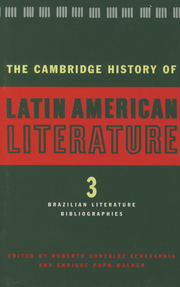Book contents
- Frontmatter
- Introduction to Volume 3
- 1 The literary historiography of Brazil
- 2 Colonial Brazilian literature
- 3 Brazilian poetry from the 1830s to the 1880s
- 4 Brazilian poetry from 1878 to 1902
- 5 The Brazilian theatre up to 1900
- 6 Brazilian fiction from 1800 to 1855
- 7 The Brazilian novel from 1850 to 1900
- 8 Brazilian fiction from 1900 to 1945
- 9 Brazilian prose from 1940 to 1980
- 10 The Brazilian short story
- 11 Brazilian poetry from 1900 to 1922
- 12 Brazilian poetry from Modernism to the 1990s
- 13 The Brazilian theatre in the twentieth century
- 14 Brazilian popular literature (the literatura de cordel)
- 15 Literary criticism in Brazil
- 16 The essay: architects of Brazilian national identity
- 17 The Brazilian and the Spanish American literary traditions: a contrastive view
- Bibliography
- Index
- References
14 - Brazilian popular literature (the literatura de cordel)
Published online by Cambridge University Press: 28 March 2008
- Frontmatter
- Introduction to Volume 3
- 1 The literary historiography of Brazil
- 2 Colonial Brazilian literature
- 3 Brazilian poetry from the 1830s to the 1880s
- 4 Brazilian poetry from 1878 to 1902
- 5 The Brazilian theatre up to 1900
- 6 Brazilian fiction from 1800 to 1855
- 7 The Brazilian novel from 1850 to 1900
- 8 Brazilian fiction from 1900 to 1945
- 9 Brazilian prose from 1940 to 1980
- 10 The Brazilian short story
- 11 Brazilian poetry from 1900 to 1922
- 12 Brazilian poetry from Modernism to the 1990s
- 13 The Brazilian theatre in the twentieth century
- 14 Brazilian popular literature (the literatura de cordel)
- 15 Literary criticism in Brazil
- 16 The essay: architects of Brazilian national identity
- 17 The Brazilian and the Spanish American literary traditions: a contrastive view
- Bibliography
- Index
- References
Summary
Side by side, and often intertwined, with the work of Brazil’s best-known novelists, playwrights, and poets, popular literature has played a primary role in the nation’s cultural life over many centuries. “Popular” is used here to mean of and by the people. It refers to prose, poetry, and theatre produced and consumed primarily by persons of limited means and education, operating on a local and, sometimes, regional basis, as opposed to that created by educated individuals writing for themselves and for a literate national and international audience.
A good deal of Brazilian popular literature is primarily or exclusively oral. It includes a wealth of Medieval Portuguese and often pan-European dramatic forms, such as puppet theatre and Christmas pageants, as well as a variety of proverbs, folktales, and legends, a number of which have all but disappeared in Spain and Portugal. Not infrequently, these Iberian transplants have fused with other, equally varied, and deeply-rooted African and indigenous traditions. From time to time, one can also detect further borrowings from the various immigrant groups (German, Japanese, Syrian and Lebanese, Italian, and Jewish, among others) which have found a home over the centuries in Brazil.
In addition to this myriad of oral traditions, many of which have yet to be systematically collected and studied, there is also a large and vibrant printed literature known as the literatura de cordel. Significant both in its own right and as an ongoing source of inspiration for a variety of educated authors, the cordel has become of increasing interest over the last few decades not only to scholars but also to a more general public.
- Type
- Chapter
- Information
- The Cambridge History of Latin American Literature , pp. 315 - 328Publisher: Cambridge University PressPrint publication year: 1996
References
- 1
- Cited by

